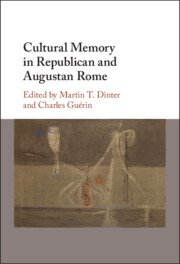Book contents
- Cultural Memory in Republican and Augustan Rome
- Cultural Memory in Republican and Augustan Rome
- Copyright page
- Contents
- Figures
- Contributors
- Acknowledgements
- Chapter 1 Introduction: What is Cultural Memory?
- Part I Writing Cultural Memory
- Part II Politicising Cultural Memory
- Chapter 10 Sulla’s Dictatorship Rei Publicae Constituendae and Roman Republican Cultural Memory
- Chapter 11 Remembering Differently: The Exemplarity ofPopulares as a Site of Ideological Contest in Late Republican Oratory
- Chapter 12 Cultural Memory and Political Change in the Public Speech of the Late Roman Republic
- Chapter 13 Remembering M. Brutus: From Mixed and Hostile Perspectives
- Chapter 14 The Making of an Exemplum: Cato’s Road to Uticensis in Roman Cultural Memory
- Part III Building Cultural Memory
- Part IV Locating Cultural Memory
- Bibliography
- Index Locorum
- Index
Chapter 13 - Remembering M. Brutus: From Mixed and Hostile Perspectives
from Part II - Politicising Cultural Memory
Published online by Cambridge University Press: 27 April 2023
- Cultural Memory in Republican and Augustan Rome
- Cultural Memory in Republican and Augustan Rome
- Copyright page
- Contents
- Figures
- Contributors
- Acknowledgements
- Chapter 1 Introduction: What is Cultural Memory?
- Part I Writing Cultural Memory
- Part II Politicising Cultural Memory
- Chapter 10 Sulla’s Dictatorship Rei Publicae Constituendae and Roman Republican Cultural Memory
- Chapter 11 Remembering Differently: The Exemplarity ofPopulares as a Site of Ideological Contest in Late Republican Oratory
- Chapter 12 Cultural Memory and Political Change in the Public Speech of the Late Roman Republic
- Chapter 13 Remembering M. Brutus: From Mixed and Hostile Perspectives
- Chapter 14 The Making of an Exemplum: Cato’s Road to Uticensis in Roman Cultural Memory
- Part III Building Cultural Memory
- Part IV Locating Cultural Memory
- Bibliography
- Index Locorum
- Index
Summary
On the Ides of March 44 BC, a momentous occasion took place in the history of Rome: Julius Caesar was assassinated in a crowded meeting of the senate.1 Almost immediately the scramble to define, legitimize, and record the act was set in motion. Marcus Junius Brutus, we are told, raised his dagger in the air and called on Cicero, presumably hoping he would be the ideal advocate for their deed; after all, Cicero had spoken out vigorously against tyranny in his published works, and this is the line they wanted to take now: that Caesar was a tyrant justly slain. For the same reason, the assassins took control over their image by rebranding themselves as ‘Liberators’ – that is, as the men who had freed Rome from Caesar’s rule. On the afternoon of the Ides, Brutus and Cassius attempted to address the people of Rome in a contio – a public meeting hastily convened in the forum. But there was little public support either then or in the meetings that followed.
Keywords
- Type
- Chapter
- Information
- Cultural Memory in Republican and Augustan Rome , pp. 218 - 238Publisher: Cambridge University PressPrint publication year: 2023

